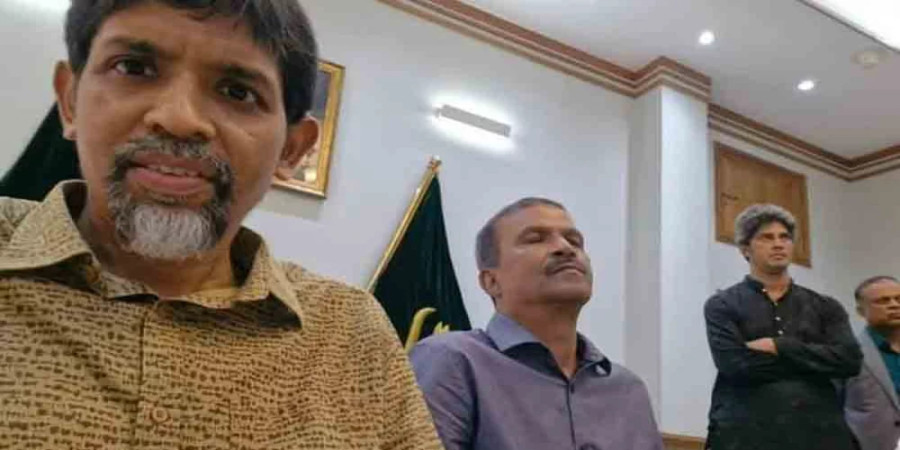
ছবি: Photo: Collected
The events of August 5 at Bangabhaban, marking a critical juncture in Bangladesh’s political landscape, continue to fuel debates. Witness Sheikh Muhammad Masud, a former agriculturalist, shared his firsthand account on social media, shedding light on the dramatic day. His post, later shared by Professor Asif Nazrul on his verified Facebook page, provides a rare glimpse into the inner workings of political negotiations under extraordinary circumstances.
Journey to Bangabhaban: Hesitation and Persuasion
Masud, who described himself as a non-political figure, stated that he was unexpectedly invited to the Army Headquarters and later to Bangabhaban. According to him, when Army Chief General S.M. Shafiuddin Ahmed invited politicians to Bangabhaban, many leaders were initially reluctant to attend.
Prominent figures like BNP's Mirza Fakhrul Islam Alamgir and Jamaat-e-Islami's Dr. Shafiqur Rahman hesitated, citing concerns over the political implications of such a meeting. General Shafiuddin repeatedly appealed for their cooperation, emphasizing the nation’s critical juncture. Eventually, they agreed, persuaded in part by Jatiya Party leaders Anisul Islam Mahmud and GM Quader, who stressed the importance of unity.
Masud also recounted the tense atmosphere during the journey. Politicians, including GM Quader and Anisul Islam, reportedly hid behind curtains in the minibus transporting them, fearing public outrage.
Discussions at Bangabhaban: Clashing Perspectives
The discussions at Bangabhaban revolved around forming an interim government. Masud highlighted divergent views among the political representatives:
- Jamaat-e-Islami's Stance: Jamaat leader Dr. Shafiqur Rahman proposed that decisions be aligned with the student leaders who had catalyzed the uprising.
- Charmonai Pir’s View: Syed Fazlul Karim of the Islamic movement opposed including non-registered groups, advocating for a government comprised solely of registered political parties.
- GM Quader’s Remark: The Jatiya Party leader controversially suggested martial law as a solution, later clarifying that he meant deploying the military for maintaining law and order.
Professor Asif Nazrul, who emerged as a key figure during the discussions, stressed that decisions should not be rushed, pointing out the necessity of thorough deliberation among the proposed 165 coordinators.
Role of Student Leaders
The pivotal role of students in the uprising was a recurring theme. Most participants acknowledged the need to involve student leaders in shaping the government. Asif Nazrul was tasked with establishing communication channels with the student groups.
Controversy Over Coordinators
Junayed Saki, leader of Gonosonghoti Andolon, reportedly played an active role in managing the coordinators. Witnesses observed him frequently leaving the meeting to ensure their arrival at Bangabhaban. Masud expressed doubts about the authenticity of some coordinators, questioning whether they were genuinely authorized representatives.
Atmosphere of Fear and Speculation
Fear and mistrust pervaded the day’s events. Leaders from smaller parties, such as the Islamic Unity Alliance, withdrew from Bangabhaban at the last minute, citing concerns over their inclusion in the government.
Masud revealed that GM Quader and others were visibly nervous, reflecting apprehension about public backlash and political uncertainties.
Reactions to Accusations
The aftermath of the events saw accusations leveled at individuals like Professor Asif Nazrul, who was criticized for his role in the day’s proceedings. Masud defended him, asserting that neither Nazrul nor BNP-Jamaat leaders appeared to have arrived with premeditated plans. He argued that the absence of preparation reflected the sudden and unprecedented nature of the political shift.
Masud suggested that the blame lies with those who orchestrated the meeting and extended invitations to controversial figures, possibly with ulterior motives.
The August 5 meeting came amid a nationwide crisis following mass protests for quota reforms. The uprising led to a temporary halt in governance, with the previous government resigning under pressure.
The transition to an interim government, spearheaded by Dr. Muhammad Yunus, aimed to stabilize the nation. However, the inclusion of certain political figures and the perceived lack of transparency during the process remain points of contention.
Masud’s account offers a nuanced perspective on a day marked by uncertainty, fear, and high-stakes political maneuvering. While debates persist over the legitimacy and outcomes of the August 5 events, the witness testimony underscores the complexity of navigating governance during a national crisis.
repoter






